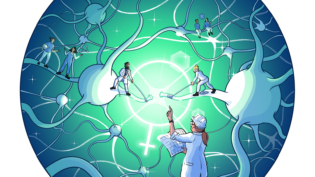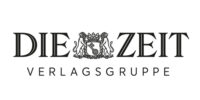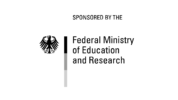
Turning Science into Action
The power of strategic collaboration in making research matter
Written by
In this month’s interview, we had the pleasure of speaking with Dr. Rosmarie Katrin Neumann, Founder of Impact Dialog, a training and coaching company, and a self-proclaimed “sustainable rebel” and passionate advocate for turning science into real-world solutions. With over 15 years of experience in both research and practice and with a deep passion for ecology and effective communication, she brings a unique blend of expertise.
Originally trained as a Landscape Ecologist, Rosi’s academic career has taken her from studying puffins and volcanic islands in Iceland to jewelled geckos in New Zealand to investigating communication and decision-making networks in multi-stakeholder groups for her PhD. Now, she combines her expertise in research with her love for nature to empower others to create meaningful and strategic impact pathways.
What inspired you to start your own business after completing your PhD?
My journey has always been rooted in my deep connection to nature—what I often refer to as being a “conservation geek.” Growing up near a forest, I felt a profound sense of belonging to the natural world, and this love for the environment fuelled my desire to make a tangible impact. I realised early on that sustainability, both in nature and in our professional lives, would drive much of my work.
Even before completing my PhD, the idea of starting my own business was on my mind, partly due to frustrations with limited PhD funding. However, the real turning point came when I co-facilitated a workshop with my supervisor, Professor Mark Reed. During the workshop, I moderated a session where participants shared deeply personal stories. In that moment, I discovered my superpower: the ability to create and hold a safe space for people to share and reflect deeply, even in a group setting. This was a pivotal moment for me. It felt natural, fulfilling, and clear that this was where I could make a meaningful impact.
With the support and encouragement of my supervisor, who recognized my potential beyond academia, I began to see that this was the path I wanted to pursue. Despite my initial fears about the bureaucratic challenges of starting a business, I registered my company in 2016. By 2017, I pitched my training services at a conference and secured my first contract, transitioning into full-time entrepreneurship once I completed my PhD. I knew that building my business was the right direction for me, as it allowed me to bring together my insights from academia with my passion for helping others create real-world impact.
The guiding principle in my work is the concept of “1+1=11” — It symbolises the power of effective collaboration and the impact we can have when we complement each other’s strengths while empowering each other to come into full blossoms as individuals. This idea is central to my approach, whether in training sessions or one-on-one coaching, where I aim to help others harness the power of collective effort and effective collaboration. It’s this mindset that drives my work and continues to shape the way I support others in their professional journeys.
Where do you find your motivation? Can you share a success story that keeps you inspired in your work at Impact Dialog?
My initial drive came from a desire to bridge the research-implementation gap. I believe that research should go beyond the academic bubble and truly engage its target audience, making a real impact and driving change. Unfortunately, much of today’s academic communication is limited to peer-reviewed articles locked behind paywalls, often incomprehensible even to academics from other fields, let alone the general public. That’s a real problem.
One of the most inspiring success stories I’ve been part of was during my time working on gecko conservation in New Zealand. My passion for protecting these reptiles quickly spread, leading to collaborations with local NGOs, landowners, researchers, wildlife enforcement agents, and even national media. On top of my research, I organised monthly gecko meetings, bringing together a community of passionate individuals. Our collective efforts eventually put pressure on the conservation department to move from passive research to active conservation.
This work attracted media attention, and I was interviewed for a popular radio show, which further raised awareness. But the most rewarding part? Seeing my friend Carey become so inspired by our work that he dedicated his Master’s and PhD to gecko protection. His continued commitment eventually led to geckos receiving a higher protection status under CITES worldwide, significantly reducing the threats they faced from poaching. That experience reinforced my belief that passion, when combined with effective communication, can truly change the world.
It all comes down to communication and engagement. I’ve seen firsthand how crucial it is for researchers to be able to strategically communicate and build relationships to make their work resonate. That’s what I love to teach—helping researchers unlock their potential to create real, lasting impact through strategic communication and trusting relationships/collaborations.
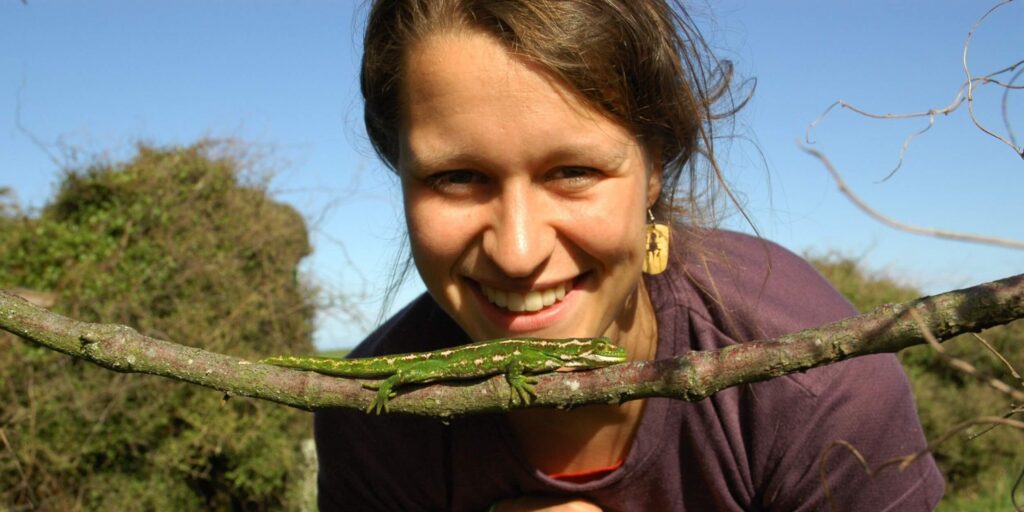
What personal challenges have you faced during your entrepreneurship journey, especially while balancing a PhD, family life, and a startup? How do you manage it all?
Honestly, I don’t manage it all perfectly—and that’s okay. Juggling motherhood, running a business, and finishing a PhD—especially during the pandemic—has been incredibly tough. I’ve also faced regular bouts of depression, which adds to the challenge. To cope, I’m constantly learning and applying practical tools to help with these struggles, and I’m passionate about sharing these strategies with others.
I’m driven by persistence, and I’ve learned to channel frustration into energy that pushes me forward. My creativity and solution-oriented mindset are essential in handling these challenges. One of the biggest lessons I’ve learned is the power of asking for help—it’s so important to remember that you don’t have to do everything on your own. A solid support network is absolutely vital.
To keep everything going, I treat myself as my most important resource. Self-care is a top priority: I focus on getting enough sleep, eating well, and taking regular breaks. I recharge through nature and meaningful interactions with others. Little things like feeling the wind on my face or listening to the sounds of nature make all the difference in maintaining my well-being.
What advice would you give to researchers who want to become sciencepreneurs?
Tip #1: Be clear about your “why.” Perseverance is vital in entrepreneurship, so having a strong, motivating reason for your transition will help keep you focused and persistent. If your motivation is rooted in a sustainable, impactful goal, it will drive you through the challenges you encounter and increase your chances of success.
Tip #2: Recognise that you can’t do it all alone. Even as a solo entrepreneur, it’s crucial to build a team and support network to fill in any gaps in your skills and knowledge. Embrace the fact that you’ll need help with the bureaucratic, technical, and social aspects of running a business. Don’t hesitate to ask questions and seek assistance — being open and vulnerable is key.
Tip #3: Establish a strong support network. Choose your connections wisely, ensuring they share your values and provide support during difficult times. A reliable support system, including friends and loved ones, is essential for both success and well-being. In competitive fields like academia, where asking for help can feel challenging, having trusted support is even more important.
Tip #4: Prioritise yourself as your most valuable resource. In coaching, we emphasise seeing yourself as a sustainable resource. To make a meaningful impact, you need to look after your own well-being and avoid burnout. Remember, you can’t improve the world if you neglect yourself.
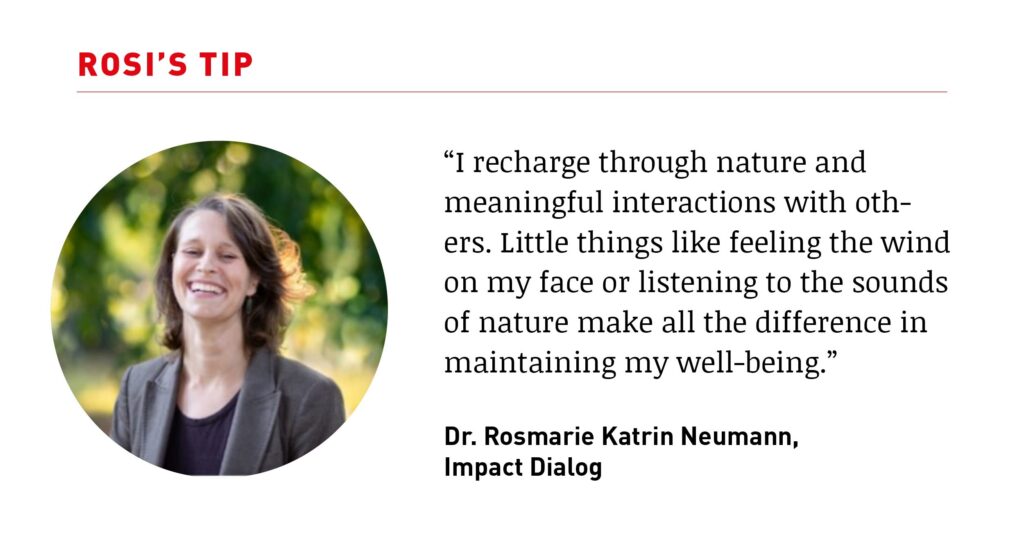
What happens next?
Check out our event calendar for upcoming workshops. Stay tuned for more updates, opportunities, and success stories!
If you have questions about Impact Dialog, connect with Rosmarie Katrin Neumann on Linkedin.
Interviewer & Editor: Dilara Ekinci
Illustration: Kamilla Nafikova
Design & Art Direction: Bianca Cramer


